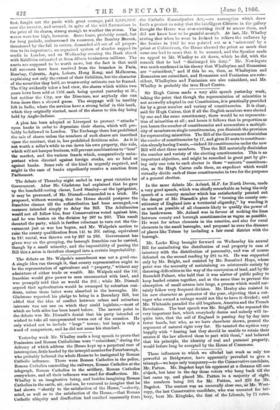Yesterday week Mr. Whalley made a long speech to prove
that Fenianifsm and Roman Catholicism were "coincident," during the delivery of which address the House kept up a perpetual roar of interruption, little heeded by the intrepid member for Peterborough, who probably believed the whole House to be instigated by Roman Catholic influence. There were Roman Catholics in the police, Roman Catholics controlling the railways, Roman Catholics at the telegraph, Roman Catholics in the artillery, Roman Catholics everywhere, and all their influence was used for disaffection. Mr. Whalley is an imaginative being, and besides imagining Roman Catholics in the earth, air, and sea, he ventured to imagine that he had shown "shortly to the satisfaction of the House,"—shortly, mind, as well as to the satisfaction of the House,—that Roman Catholic ubiquity and disaffection had resulted necessarily from first, fought out the panic with great courage, paid 3,000,000/. / the Catholic Emancipation Act,—act assumption which drew over the counter, and seemed, in spite of the wild fluctuations in forth a protest so noisy that the intelligent Chinese in the gallery
thought the House was over-exartiog itself to AMMO them, and did not know how to be grateful enough. At last, Mr. Whalley stating that when he went to Ireland to, relieve the sufferers by the famine in 1317 he was pointed oat as a miscreant' by a priest at Cahirciveen, the House cheered the priest so much that some one had to move that it be counted, and the Speaker made an appeal to Mr. Whalley to sit down, which he did, with the remark that he land " discharged his duty." Mr. Newdegate was much confirmed in his theory that Whalleyism and Romanism are "coincident," and if this be so, then, as Whalleyism and Romanism are coincident, and Romanism and Fenianism are coin- cident, Whalleyism and Feniauism are also coincident, and Mr. Whalley is probably the true Head Centre.






























 Previous page
Previous page